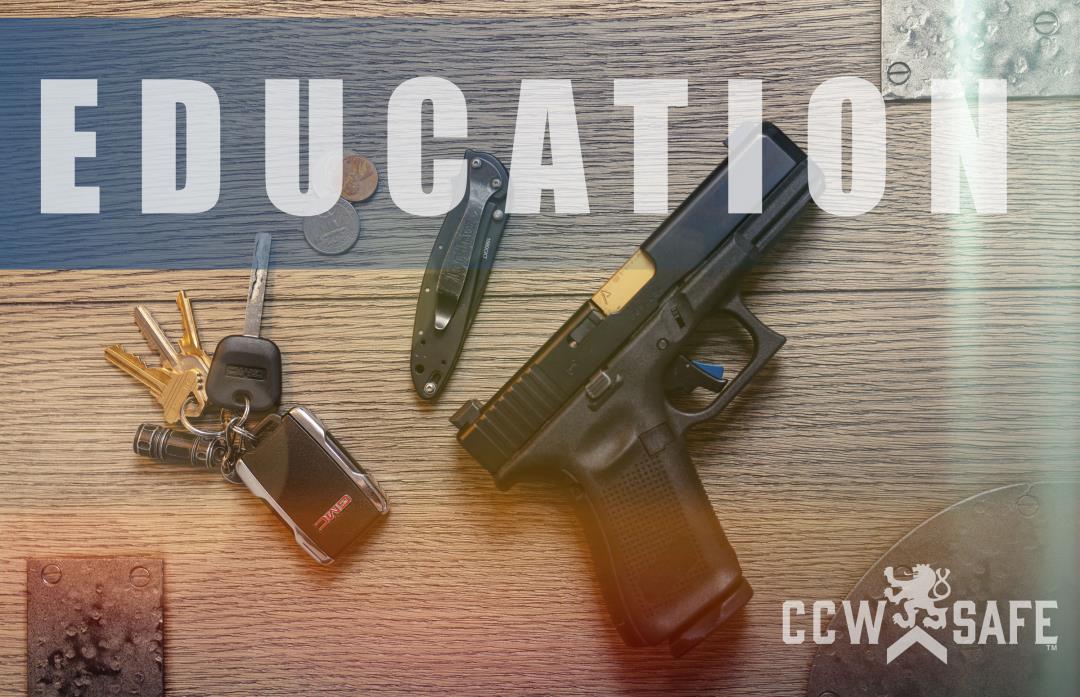
Posted on December 10, 2018
The Four Principals of Concealed Carry Commitment- Part 2: Education
Part 2: EDUCATION
In our series The Four Core Principles of Concealed Carriers, we’re exploring what I see as the most important principles concealed carriers should adopt to be safe and responsible as they exercise their right to carry. In this installment we will examine the importance of EDUCATION and a personal example which made me chose it as a principle.
In the last installment I told you about the killing of Deputy George Pfeil early in my law enforcement career. After George was killed, I spent a lot of time with the agency trainers. I spent time in the books, reading what I could about tactics and the law. I immersed myself in my renewed value of officer safety and educating myself and staying current on those things that were pertinent to my career. Intelligence, officer safety, new laws and trends. I wanted to make sure I wasn’t the next statistic, the next victim. Information was my best friend.
Continuing our example of the social setting, I also ask my inquiring subjects what they know about concealed carry. Usually, they know little or nothing. EDUCATION is the next element of COMMITMENT. Not to be confused with TRAINING (up next), educating the potential concealed carrier is a stepping stone to training and eventual carry. Each state has laws and regulations for personal concealed and open carry, as well as home defense and carrying in a motor vehicle. It’s up to you to know and stay aware of those as ongoing education.
Education involves learning the laws of your own state, and knowing when, where and how you can carry legally. Know your regular environment at home, work and elsewhere. Know where you are legally allowed to carry within your state and the restrictions for carrying. Can you carry in your car when you drop your kids at school? Which government buildings and public businesses are off limits to concealed carry? Do you travel state to state, and what are the reciprocal agreements in place? Can you transport your weapon when you fly? What about your final destination- is it legal to carry there? I have had several business people discuss concealed carry and some just assume if they have the permit in our state (Florida for me), that they can carry everywhere and Florida’s laws apply.
I know this sounds simplistic, but today, states are modifying their reciprocal agreements or dropping them entirely, often for political and social reasons. Don’t get caught with your pants down on this. Stay educated on concealed carry. DON’T ASSUME ANYTHING. You can easily find reciprocity information at any number of sites online, or you can call the state(s) you are travelling to, to get the most up-to-date info. One problem with online research of reciprocity is that some websites are not updated regularly with new laws from each state. “Google is your friend” MOST of the time, but make sure the information you are seeking is accurate.
Education is knowing the laws of self-defense in your state. Know what the standard is for use of force in defense of yourself and for others. Understand the potential legal consequences for use of deadly force. Make sure you are well aware and are willing to make that commitment to yourself and those around you. It’s easy to say “I can do that”. Wait until you are being questioned by police in the middle of the night. Wait until they take your weapon, put you in a car and read you Miranda. That’s when reality hits home. Make no mistake. If you shoot someone, or for that matter, use any kind of deadly force, you will be taken into custody. That’s how it works. Be prepared and be knowledgeable. Be represented and be educated.
Education goes beyond knowing the laws of your state. By this, I mean before you commit to concealed carry, and certainly before you buy a weapon, ask the hard questions of what kind of concealed handgun you are comfortable with and generally speaking, how will you be carrying? Comfort is a huge issue for concealed carry. One of the biggest complaints I hear from those who carry is how uncomfortable or inconvenient it is to carry. Oftentimes, the person has not tried multiple weapons or methods of carry, nor consulted with professionals at a gun store or range to try to work out potential problems. They simply bought a weapon recommended by a friend or family member without trying out a carry method and had to live with the result.
Personally, I am comfortable with a small five shot revolver or subcompact autoloader. I live in Florida, so shorts and a tee shirt or polo are common for me probably nine months out of the year. I need something that is light, compact and easy. Maybe something to slip into the cargo pocket of my shorts. Ladies may prefer to carry in a purse or fanny pack. Plan to carry for how you live and dress, don’t plan to live and dress around your handgun. Many gun stores with ranges will allow you to try weapons before you buy. Take them up on the offer. Ask your friends to try their weapons, and ask what they like and dislike about concealed carry.
Don’t get caught up in the high capacity argument for concealed carry. Remember, concealed carry is for self-defense. Think close-in contact. A fight in a phone booth (yes I really said that. I told you I was old school). I look for what I call “get off me” guns. Subcompacts and small revolvers. The likelihood of using my 25 yard shooting skills or emptying a 15 round magazine are almost nil in a self-defense situation. But again, buy and carry what you feel comfortable with and what works for you. Don’t let anyone tell you that you are wrong if you prefer a revolver over an autoloader, or a .380 to a .40.
Remember, concealed carry isn’t for everyone, and no one should feel compelled to carry if they aren’t prepared to make the COMMITMENT to carry.
At the end of this phase of your journey to the concealed carry COMMITMENT, you are ready to TRAIN for concealed carry. Let’s go to the range!
Remember, the concealed carry COMMITMENT is a pledge to yourself and to those around you that should revolve around these four core principles. In our next installment we’ll examine TRAINING and why it is important for concealed carriers to adopt to prepare themselves for the worst-case scenario.
 |
Bob O’ConnorBob O’Connor is a highly experienced criminal investigator, and has had the opportunity to be involved at both the investigator and major case supervisory/management roles in multiple high profile, media-intensive investigations during his career. Those cases and the various assignments over a 40 year career provide Bob with a unique perspective of the criminal justice system and the interaction between the police and the public. He has worked at the local, county, state and federal levels successfully, using multiagency cooperation as the basis for mutual accomplishments. Retired FDLE Special Agent Supervisor |